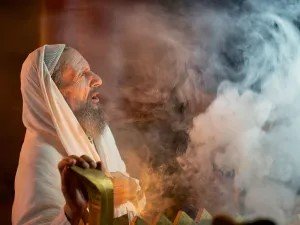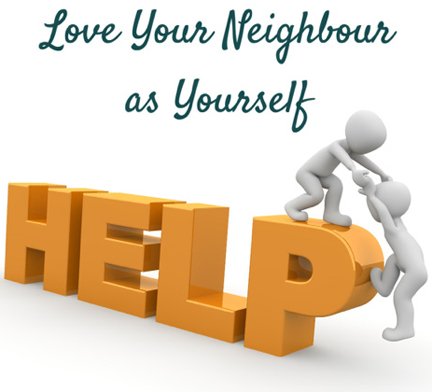One thing I have come to appreciate over the years about the Psalms is their raw honesty. I don’t doubt that every possible human emotion is expressed in one Psalm or another. Sometimes I go to the Psalms to help me express my own emotions when I am feeling overwhelmed or under pressure. Psalm 27 is a Psalm that is honest enough to admit that even people of faith sometimes have fear and doubt. Because the world is the way that it is, we will find our faith being tested, sometimes on a daily basis. And we can surely relate to the words of Psalm 27 as we contemplate what it means to trust in God.
As I read the opening words of Psalm 27, “whom shall I fear?” and “of whom/or what should I be afraid?” caused me to make a list of things I am afraid of. There is a measles outbreak in our country that, as of Wednesday, has reached 15 states. There are rising prices for everything, including food, and the addition of tariffs will only make the prices go higher. How will I afford to take care of myself and my household? I am afraid that if peace cannot be negotiated for Ukraine, the war may spread into more of Eastern Europe. I worry when I hear about the Texas legislature creating a law that makes it illegal to state that you are “transgender” on any official document. In other words, it is illegal to be a transgender person in Texas. Who will be next? Will these kinds of laws be passed in other states as well?
Lindsay P. Armstrong, a Presbyterian pastor, writes, “In a world teeming with broken relationships, personal disappointments, public scandals, political games, cultural disrespect, and increased terrorist threats, trust is difficult to extend – even to God. Even the faithful know bitter disappointment and crushing pain. We are familiar with people maneuvering against us. Even God’s own know the feeling of abandonment or being ‘turned away’ by God … Does God really deliver people from evil or hide people ‘in his shelter in the day of trouble’?” She goes on to say that Psalm 27 “offers camaraderie and subtle guidance to someone scared or uncertain about the future. Whether this person is surviving cancer, navigating a twelve-step recovery program while tempted by old adversaries, or returning from military to civilian life still dealing with PTSD demons, Psalm 27 maintains gritty honesty as it dances back and forth between fear and trust.”
There is a tension that we hold within us between fear and faith, doubt and trust. We are only human, after all, and it is a big ask to expect us to completely trust in God when so many times the people we have trusted have let us down, betrayed us, or even done harm to us. And yet, that is what we are called to do: trust in God to take care of us, to be our light and our salvation, to be the stronghold of our lives. We are called to wait for the Lord when trouble surrounds us, believing that we can be strong and finding the courage to take heart because we believe that God is coming to save us. Richard C. Stern, a professor of homiletics in St. Meinrad, Indiana, says that we must depend on God because God is all we have to depend on. He writes, “There is none other to defend us. There is no one else, only God. There is nothing I can do myself. [Psalm 27] is not some mere antiwar protest song; it is a radical posture for living. It is to be applied in every circumstance, at every level…”
I find comfort in Psalm 27 in the knowledge that I can express my doubts and fears to God, even while depending on him to save me in the end. God does not expect us to never doubt or question or feel afraid. There are certainly thousands of things in this crazy world that could cause us to doubt, question, and feel afraid. What God expects is that when we feel that way, we turn to him and trust him to be there for us. That kind of faith is not easy; it is hard. It takes a lifetime to develop. As Lindsay Armstrong puts it, “faith is not simply about believing or not believing …at its best, faith is not about doctrine at all. It is about the truth of what we have known. The life of faith is grounded in experience; it is about the real mystery, awe, pain, and grace that we know. As such, the faithful live at the intersection of religious ideas and real life, humbly bringing soaring trust, persistent doubts, and everything in between into conversation with Scripture, church tradition, the chorus of witnesses, and the Holy Spirit who works in and through all.” That kind of faith is grown slowly over a long period of time and with experiences along the way that build our trust and our confidence in God.
But sometimes people resist going to God and trusting God to provide strength and grace. In the Gospel lesson, Jesus laments the fact that his own people have refused, time and again, to hear the call of God. Michael B. Curry, former presiding bishop of the Episcopal Church, writes, “Jesus speaks in terms of abject disappointment and utter heartbreak at the refusal of his own people to hear and heed the summons of God to draw near, to gather, and to come home.” This stubbornness has made God even more committed to bring us to him. Curry writes, “For Jesus, God’s persistent dream, compassionate desire, and bold determination is to gather God’s human children closer and closer in God’s embrace and love. That mission and commitment is at the center of Jesus’s work. Like a mother hen, God seeks to draw, embrace, include, and welcome God’s children into the family of humanity that God has intended from the dawn of Eden itself… Luke saw a persistent intent on the part of Jesus to bring in those cast out, to raise up those beaten down, to bring to those on the extremities of the social order close to the heart of God.”
I don’t know a lot about chickens. Pennie’s sister used to have chickens in the place where they used to live. I know that they were a lot of work. They had to be put into the coop at night and let out in the morning. They had to be fed and given water. They also had to be protected from the cold during the worst winter days. When Jesus talked about gathering up his people as a hen gathers her chicks, I didn’t know how to imagine this, because I had not seen it done. (Pennie’s sister’s chickens were all grown and had no babies.)
I decided to look up mother hen gathering chicks on Youtube. I found a video that showed the mother raise up and the chickens all come under her body, under her protective wings. She then settled down on them. She didn’t, as I had expected her to do, go after the chicks. She sat still and they came to her. She wasn’t chasing them down to force them to go under her; they were choosing to come to her and let her gather them up. In the same way, Jesus doesn’t chase after us or force us to accept the protection he offers, the protection promised in Psalm 27. We have to choose to go to God through Jesus Christ. We have to allow him to gather us up and bring us home.
Taken together, the readings for this Second Sunday in Lent bring us a picture of a God who waits for us to accept his invitation to keep us from being afraid of anything or anyone on this earth. While we know that pain and suffering may, and probably will, come our way, we also know that we have a God who will be with us in each and every circumstance of life. Where Is God When It Hurts? was the title of a book I ran across a few years ago. The answer, of course, is that God is with us when it hurts. God is with us when life is hard and when there are many things to be afraid of. All we have to do is allow him to gather us up as a mother hen gathers up her chicks. And then we will know we are safe, we are home.




























